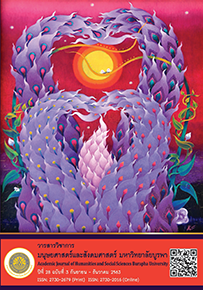A Semantic Network Analysis of Thai Utterances Used by Depression Patients
Main Article Content
Abstract
This research aimed to analyze a semantic network of Thai utterances used by depression patients with individual interviewing 14 female patients aged 20 years and above after triage process of the Psychiatry at Lampang Hospital. The research instruments included questions for the interview and tape recorders. The results revealed that the semantic network was structured by 4 central categories: self, disease, society, and hope. The “self” category consisted of self-dissatisfaction as its sub-central category which could be divided into 4 subcategories including being bad person, burden of others, one who took other responsibilities and unfortune person. The “disease” category included 3 sub-central categories: uncontrollable things, symptoms, and anchors. The “society” category was composed of 5 sub-central categories: misunderstanding, annoying, gossip, force, and leaving. The “hope” category included 2 sub-central categories: hope for themselves, and hope for the society. From these results, it could reflect the patients’ concepts, viewpoints, and understanding towards themselves, Depression, society, and their hope for understanding from people around them. These categories were connected to one another by cause-effect relation. Therefore, if people around them treated them with understanding, they would have positive attitude towards themselves, the disease, and the society. Then, the patients could feel better and recovery would ensue.
Downloads
Article Details
บทความทุกบทความเป็นลิขสิทธิ์ของวารสารวิชาการมนุษยศาสตร์และสังคมศาสตร์ มหาวิทยาลัยบูรพาเท่านั้น
References
จันทิมา อังคพณิชกิจ (ผู้บรรยาย). (2562, 31 กรกฎาคม). โรคซึมเศร้า: จากปรากฏการณ์สู่งานวิจัย ใน โครงการการพัฒนาศักยภาพนิสิตระดับบัณฑิตศึกษาหลักสูตร ศศ.ด. (ภาษาศาสตร์) ครั้งที่ 2. พะเยา:คณะศิลปศาสตร์ มหาวิทยาลัยพะเยา. เอกสารประกอบการบรรยาย.
พบแพทย์. (2559). โรคซึมเศร้า. เข้าถึงได้จาก https://www.pobpad.com/โรคซึมเศร้า
อัญชลี ทู. (2562). กรมสุขภาพจิต ห่วงวัยรุ่นเยาวชนไทยมีภาวะซึมเศร้า แนะคนรอบข้างรับฟังอย่างเข้าใจ. เข้าถึงได้จาก http://www.prdmh.com/ข่าวสาร/ข่าวแจกกรมสุขภาพจิต/1384-กรมสุขภาพจิต-ห่วงวัยรุ่นเยาวชนไทยมีภาวะซึมเศร้า-แนะคนรอบข้างรับฟังอย่างเข้าใจ.html
Al-Mosaiwi, M., & Johnstone, T. (2018). In an absolute state: Elevated use of absolutist words Is a marker specific to anxiety, depression, and suicidal ideation. Retrieved from https://journals.sagepub.com/doi/pdf/10.1177/2167702617747074
Koteyko, N., & Atanasova, D. (2018). Mental health advocaty on twitter: Positioning in depression awareness week tweets. Retrieved from https://www.Elsevier.com/locate/infoproman
Langacker, R. W. (1991). Concept, image, and symbol: The cognitive basis of grammar. Berlin: Mouton de Gruyter.
Pennebaker Conglomerates, Inc. (2015). LIWC/Linguistic inquiry and Word Count. Retrieved from https://liwc.wpengine.com/
Reali F., Soriano T., & Rodriguez, D. (2015). How we think about depression: The role of linguistic framing. Retrieved from https://www.sciencedirect.com/science/article/pii/S0120053415000369?via%3Dihub
Tausczik, Y. R., & Pennebaker, J. W. (2010). The psychological meaning of words: LIWC and computerized text analysis methods. Journal of Language and Social Psychology, 29(1), 24-54.
Williamson, J., Godoy, E., Cha, M., Schwarzentruber, A., Khorrami, P., Gwon, Y., Kung, H.-T., Dagli, C., & Quatieri, T. (2016). Detecting depression using vocal, facial and semantic communication cues. In AVEC '16: Proceedings of the 6th International Workshop on audio/visual emotion challenge (pp. 11-18). Retrieved from https://dl.acm.org/doi/pdf/10.1145/2988257.2988263
Wolohan, J.T., Hiraga, M., Mukherjee, A., & Sayyed, Z. A. (2018). Detecting linguistic traces of depression in topic-restricted text: Attending to self-stigmatized depression with NLP. In Proceedings of the First International Workshop on Language Cognition and Computational Models (pp. 11-21). Retrieved from https://www.aclweb.org/anthology/W18-4102.pdf
Yoo, M. L., & Ha, T. (2018). Semantic network analysis for understanding user experiences of bipolar and depressive disorders on reddit. Retrieved from https://www.Elsevier.com/locate/infoproman


